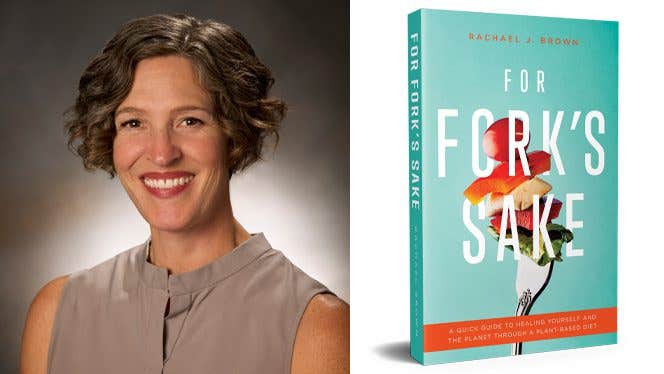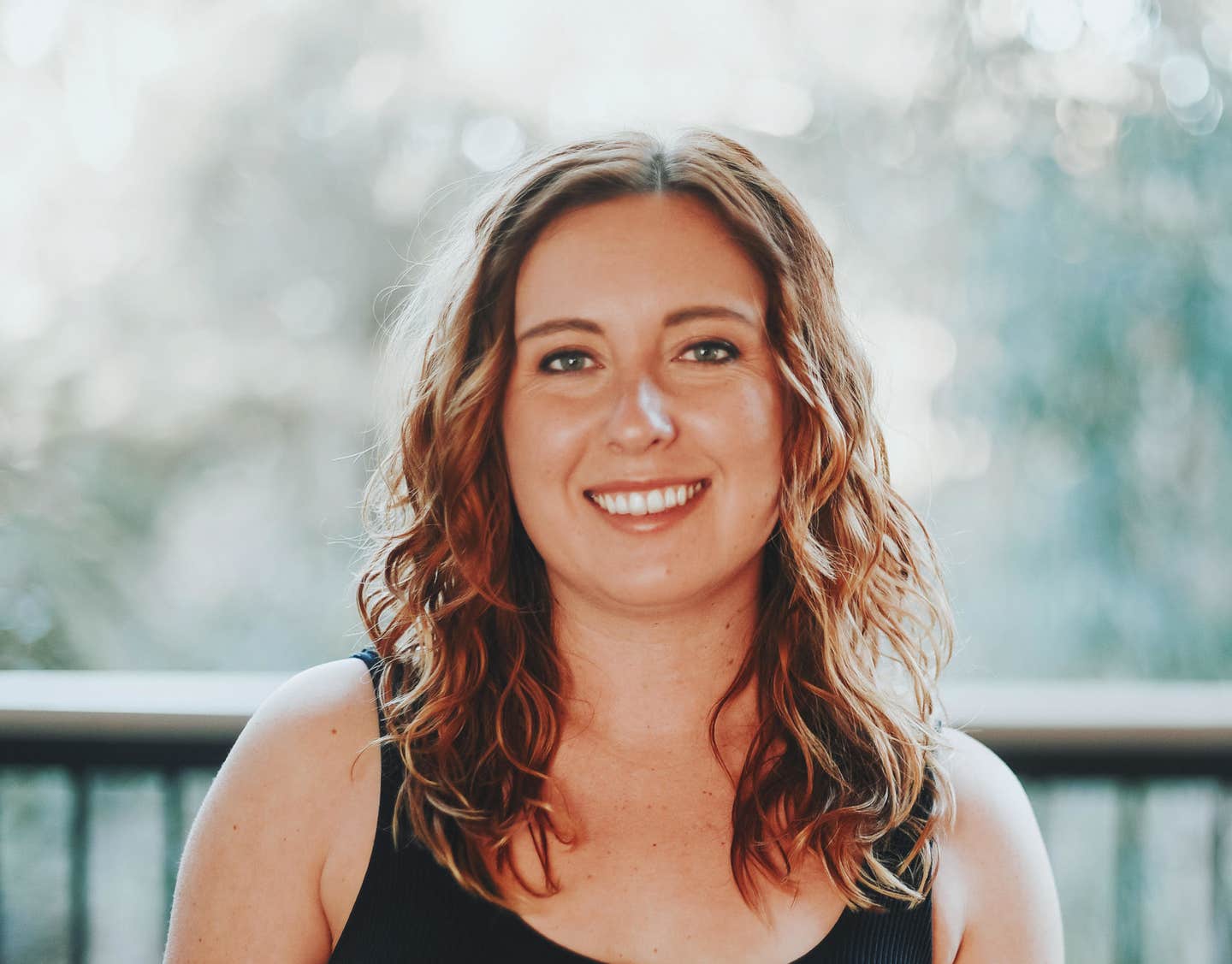
For Fork’s Sake: Rachael Brown’s New Book Makes Whole-Food, Plant-Based Eating Easy for Families
Plant-based parents are all too familiar with the challenges of raising a family without animal products. From pesky “how will you get your protein?” questions to picky eaters, prioritizing the health of your family isn’t always a walk in the park. Luckily, Rachael J. Brown, a certified plant-based nutrition educator and WFPB parenting extraordinaire, is here to help.
Striking the middle ground between an informational how-to guide and beginner’s cookbook, Brown’s debut book, For Fork’s Sake, teaches readers how to make the switch to an oil-free, whole-food, plant-based lifestyle. Broken down into an approachable 10-day plan, Brown’s personal and professional expertise shine through in easily digestible chapters that are sprinkled with scientific research, recipe suggestions, check-lists, and engaging anecdotes. Forks Over Knives chatted with Brown about the impetus behind her new book, how to help people of all ages make the switch, and why “the great kitchen clean-out” is the most important element of a successful WFPB transition.
Why did you start eating whole-food, plant-based?
Rachael Brown: Even from a young age I had high cholesterol. My dad had high cholesterol, too, and I watched him take medications that had lots of side effects. I really didn’t want to take medication so I’d go on stints of cutting out cheese and eggs, but would always eventually come back to them. Then I read The China Study and it made so much sense to me. My family and I ate whole-food, plant-based and no-oil for 17 days, and when I got my blood work done after that, my cholesterol had dropped 50 points. My doctor said, "Whatever you're doing, keep doing it, because I couldn't get your cholesterol to do that with medication." That was 12 years ago now, and we haven’t looked back.
What spurred you to write this book?
RB: For the last 10 years I’ve been working in the wellness realm doing massage and a pain-neutralization technique that helps relieve chronic pain. Once COVID-19 hit and I couldn’t [take clients] anymore, I got my plant-based nutrition certificate from the Center for Nutrition Studies. I'd always wanted to write, and I’d talked with a lot of people who wanted to make the WFPB change but they didn't have the practical information on how to do it. You could find long scientific books or straight-up cookbooks, but not much in the middle, so I tried to come up with something that would be a quick and easy guide for people curious about this lifestyle. This was my COVID project, really, and I’m glad something good came out of that time!
In your book you talk about “HAPPY” food. What is that?
RB: The acronym for “whole-food, plant-based, no-oil” doesn't really roll off the tongue. So I was trying to come up with something that would be more memorable and stand in contrast to “SAD,” the standard American diet. So I landed on "Healthy and plant powered, yay," or “HAPPY” food, as a fun way for people to remember it's healthy and plant powered.
How would you reassure someone who wants to make the WFPB transition but is worried they won’t enjoy it?
RB: I think my best advice is to remember that your taste buds change after [just a few weeks] of eating differently. They actually mold themselves to whatever you’re eating. Kids learn to eat whatever you give them, so if they're used to fries and chicken nuggets, that's just a learned thing, not something that will last forever. In some ways my kids adapted better, easier, and earlier than me or my husband did because we had more emotional ties to certain foods. For them, they didn't have as many of those connections to break.
What are some of the health improvements your kids have seen since going WFPB?
RB: One of the biggest differences was not having acne in middle and high school. Their friends were like, "What are you doing? How do you not have acne?" And it was all about the food they ate. They noticed if they had pizza or fries with their friends that they would break out, so they just stopped. My son also does blood work twice a year because he has the same issue with cholesterol as I do. When he was super young he already had carotid artery plaque, but after going WFPB he went from needing medication to having cholesterol that was below normal. We haven’t forced our kids to do this, though. We always say, "We eat this way at home, but you can eat however you want with friends." In the long run they’ve chosen to stick with this lifestyle because it makes them feel better.
Your book talks about getting older parents or grandparents on board with a WFPB diet. Tell us more about that.
RB: Honestly, [talking with the older generation] has been the bigger struggle, which is funny, because unlike kids, they have the ability to read the information and fully process it. But they do have a lot more years of eating comforting foods that they’ve been told are “healthy.” I think a lot of older people would love to get off medications that they have to pay for or that they have side effects from, and 10 days on a HAPPY diet is all you need to start seeing changes in your health. But I think older people often can’t envision it because they think a meal is not a meal without meat. To get them on board I recommend making a similar type of comfort food but doing it plant-based, like lasagna, so that they won’t even realize they’re eating differently. It’s a good introduction to a lifestyle that often seems really foreign.
It’s common to hear that eating WFPB is more expensive, but is this actually true?
RB: I often hear people say, "I couldn't eat like that; I don't have a Whole Foods near me.” When you really stop and break it down, the meats, cheeses, ice creams, and processed snacks are the most expensive things at the grocery store. Showing people you can fill your cart with vegetables, potatoes, beans, and nuts and still come out ahead is something they have to see for themselves, and something I highlight in the book. I personally love Jeff Novick because he talks about creating meals around SNAP programs where you can eat plant-based for $2.50 a meal. You can get these ingredients at a dollar store if you need to. It's really not necessary to have a specialty store. In fact, it's the opposite once you give it a try.
Walk us through the 10-day WFPB plan in your book.
RB: In the beginning I give people information to answer the question, "Why should I even do this?" The first part is for learning what this lifestyle is all about from both an environmental and health perspective. Then the next step is “the great clean-out,” as I call it. Just think of it as Marie Kondo–ing your kitchen to get rid of all the extra stuff that you don't need, to set yourself up for success over the next 10 days. There's some recipe ideas and tips on finding what works best for you and your family. Then it gets into some of those bigger issues like, "Now I need to go to a potluck; what do I bring?" or, "Now I need to go to a work event at a restaurant. What do I do?" Or, "My parents or grandparents are asking, 'How are you doing this to yourself or your kids? Are you going to survive?'"
What’s the best advice you can give to someone who’s struggling to transition to a WFPB lifestyle?
RB: I think the key is to really commit to the kitchen clean-out. If you have to leave your house and go to the store to get a bag of chips or a chocolate bar, it’ll put an additional obstacle in your way. It’ll make it so much easier to succeed. Once you've done that for a short period of time and you begin to feel all the benefits, then it's a lot easier to maintain. But if you only go halfway and are still eating your non-vegan snacks, you're not going to notice the benefits and feel motivated. However, I do think that what matters is what you do 90% of the time. It’s important to give yourself grace if you splurge a little or fall off the bandwagon. Just be committed to jumping right back on.
What do you hope readers take away from your new book?
RB: That anybody can do this. I want people to understand that it'll just make your life simpler, really. You'll be saving the planet. You'll save money. You'll feel better. Simple as that.

About the Author

About the Author
Megan Edwards
Join our mailing list
Get free recipes and the latest info on living a happy, healthy plant-based lifestyle.
By providing your email address, you consent to receive newsletter emails from Forks Over Knives. We value your privacy and will keep your email address safe. You may unsubscribe from our emails at any time.